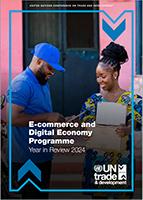
In 2024, UN Trade and Development (UNCTAD) celebrated its 60th anniversary. Ever since its inception, technology has been an integral part of the mandate of the organization. At that time, member States had identified that technology and technical know-how were essential preconditions for improving productivity, promoting export growth and advancing development. They also recognized the growing technological gap between developed and developing countries, its implications for trade and development, and for their own prospects for catching up.
While the discussion that took place in the 1960s remains highly relevant today, prime attention has now shifted to digital technologies. Key global debates in 2024 reconfirmed the relevance of the E-commerce and Digital Economy (ECDE) Programme.
In September, world leaders in New York agreed on the Pact for the Future, which contains the Global Digital Compact (GDC). Commitments in the Compact are well aligned with the mission of the ECDE Programme. They stress, for example, the importance of bridging digital divides, achieving more inclusive and sustainable digital economies, and developing better governance of data. UNCTAD will in the coming years be playing a key role in facilitating the implementation of the GDC.
The Digital Economy Report 2024 was launched in July, stressing the need to better understand and address the environmental footprint of digitalization. While the power of digital technologies can help to advance inclusive and sustainable development, we also need to mitigate their negative environmental impacts. The report calls for a shift towards a circular digital economy, characterized by responsible consumption and production, renewable energy use and comprehensive e-waste management.
Our work continued to contribute to strengthening the readiness of countries to benefit from the digital economy through new eTrade Readiness Assessments, e-commerce strategies and other forms of assistance. For example, the Government of Trinidad and Tobago entrusted us to prepare an eTrade Readiness Assessment and support the development of its new National E-commerce Strategy. We were also pleased to respond to the request of Indonesia, the first G20 country to benefit from our assistance in this area.
In 2024, the focus on implementation of policy reforms in partner countries intensified. In May, more than 250 experts from 77 countries met over three days at the Intergovernmental Group of Experts on E-commerce and the Digital Economy to discuss and agree on recommendations on how to move from assessments to implementation. This also offered an opportunity to demonstrate the eTrade Reform Tracker, which is now seeing growing demand from partner countries.
We welcomed a new cohort of eTrade for Women Advocates, and together with Ms. Ajaita Shah of India, we delivered our first regional Masterclass for South Asia, in New Delhi. Supported by the Government of China, we also accompanied 31 women digital entrepreneurs from 12 developing countries on a study tour of Beijing and Shanghai’s leading digital players. By the end of the year, more than 330 women founders of businesses in the digital economy around the world had joined the eTrade for Women communities.
Another key area of work was the measurement of e-commerce and digital trade. Together with partner organizations, we leveraged the Handbook on Measuring Digital Trade in several capacity-building workshops around the world. The newly established Task Group on Measuring the Value of E-commerce led by UNCTAD held four meetings, advancing towards the development of guidelines in this area.
Peering into the future, 2025 will be an important year. It will see the beginning of the implementation of the GDC, where UNCTAD will play a leading role especially in the areas of data governance and building an inclusive digital economy.
The international community will complete the Review of the first 20 years of implementation of the outcomes of the World Summit on the Information Society (WSIS), to which we will contribute. The ECDE Programme will furthermore be supporting the BRICS Presidency and the G20 Presidency in the digital domain. And in October, UNCTAD will hold its 16th Ministerial Conference in Viet Nam, where member States will chart the path forward for the organization and define the priorities of its work in developing countries, and notably in the least developed countries. The digital dimension is set to be re-emphasized.
I am grateful for the trust that member States and our development partners continue to place in the ECDE Programme. The work on shaping an inclusive digital economy is still very much work at an early stage. Working closely with our partners has become more essential than ever for moving the needle in the evolving digital economy towards more favourable development outcomes.
The entire team of the ECDE Programme looks forward to further connecting the dots with you.
Torbjörn Fredriksson
Head, E-commerce and Digital Economy Branch


